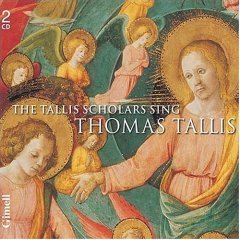
I have never placed my hope
in any other than you, O God of Israel,
who can show both anger and graciousness,
and absolve the sins
of suffering man.
Lord God, creator of heaven and earth,
be mindful of our humiliation.
—Thomas Tallis, Spem in alium, translated by The Tallis Scholars.
For several days now, my tiny apartment has been resounding with the magnificent polyphonic liturgical music of Thomas Tallis (1505-1585). I'm listening to him now as I write this. In a post back in April, I mentioned my fairly recent discovery of Tallis and my determination to get a CD of his music, but I couldn't decide on which one. After much dithering, I chose The Tallis Scholars Sing Thomas Tallis, a two disc collection by the English choral group who, as their name implies, devote themselves to the music of Tallis and other Renaissance liturgical composers. I chose this album because of the completeness of the collection, the thoroughness of the liner notes, and the inclusion of complete translations of all the Latin lyrics. This was despite the complaints of some listener-reviewers on Amazon.com who felt that the soprano voices tended to overwhelm others and predominate on Tallis Scholars recordings. My only real quibble with this album is with the packaging. The little tray holding the two discs broke off from the rest of the container on the second day I had the album. Surely there must be a simpler and more durable way to package this music! On balance, however, I would say that the strengths of this collection far outweigh the weaknesses.
The collection itself includes nearly three hours of music from throughout Tallis's career, both pieces he wrote for the Roman Catholic liturgy in Latin and the Anglican liturgy in English. I find that while the English material such as "If Ye Love Me," is indeed quite beautiful in a stark, severe sort of way, it lacks the soaring, transcendent quality of the Catholic, Latin compositions. Judging from the music alone, I would say that in his heart of hearts, Tallis was and remained a Catholic even though he lived in a time of considerable social and political pressure to become Protestant. His sympathies, musically speaking, are plainly with the Catholics. The liner notes point out that Tallis's Catholic and Anglican pieces are written in significantly different styles because the Anglican liturgy placed a premium on the congregation's ability to understand the text. Since the Catholic compositions were in Latin to begin with, the congregation's ability to understand the text was probably considered somewhat less important, which allowed Tallis to be freer musically and create layers upon layers of sound. Again, judging from the music alone (and I am certainly no expert), I would say that perhaps Tallis's intent with his Catholic, Latin compositions was not so much to inspire reflection on a text but to create a mood, a general atmosphere, if you will, of prayer, praise, and adoration. Spem in alium, quoted above, is usually considered Tallis's masterpiece, but I find myself especially moved by Gaude gloriosa Dei mater ("Rejoice, O Glorious Mother of God"), a hymn to the Blessed Virgin that goes on for over 15 minutes. To me, this music is what heaven sounds like.
I expect this is only the beginning of my adventures in polyphony. I'd like to get some more Tallis recordings (perhaps by different ensembles to compare their interpretations of various pieces), as well as works by Byrd and Palestrina. Stay tuned.
No comments:
Post a Comment